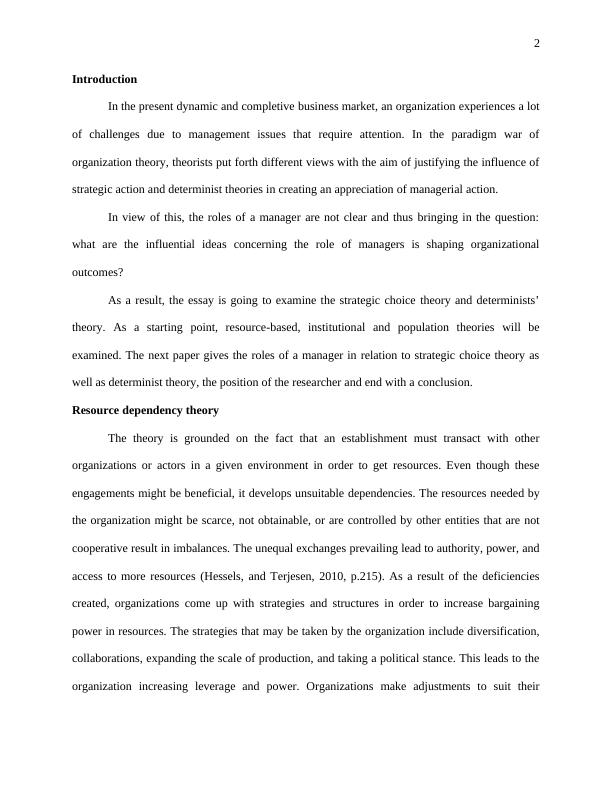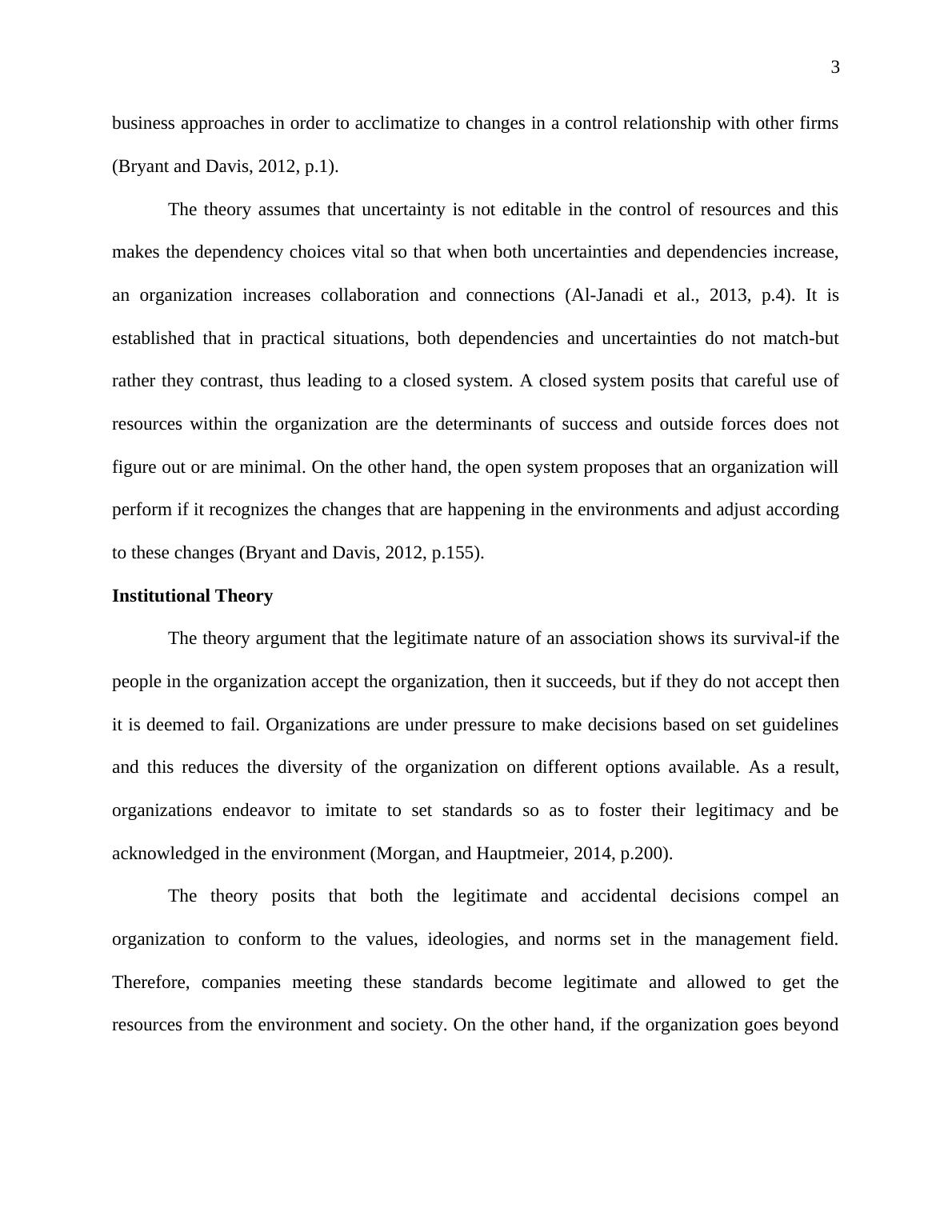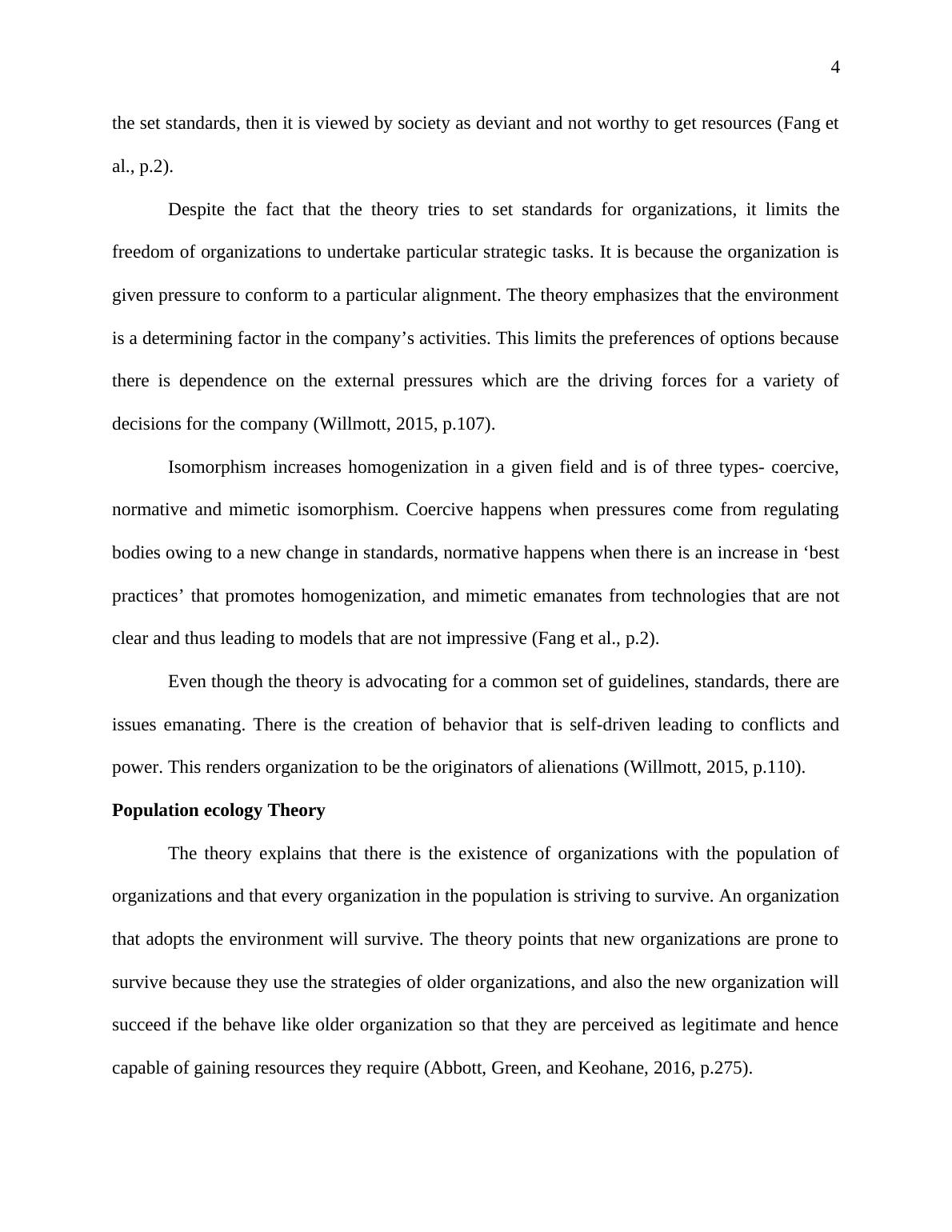The Prominent Role of Managers in Influencing Organization Outcomes
Added on 2023-03-31
11 Pages2608 Words251 Views
The Prominent Role of Managers in Influencing Organization Outcomes
Student’s Name:
Institution:
Student’s Name:
Institution:

2
Introduction
In the present dynamic and completive business market, an organization experiences a lot
of challenges due to management issues that require attention. In the paradigm war of
organization theory, theorists put forth different views with the aim of justifying the influence of
strategic action and determinist theories in creating an appreciation of managerial action.
In view of this, the roles of a manager are not clear and thus bringing in the question:
what are the influential ideas concerning the role of managers is shaping organizational
outcomes?
As a result, the essay is going to examine the strategic choice theory and determinists’
theory. As a starting point, resource-based, institutional and population theories will be
examined. The next paper gives the roles of a manager in relation to strategic choice theory as
well as determinist theory, the position of the researcher and end with a conclusion.
Resource dependency theory
The theory is grounded on the fact that an establishment must transact with other
organizations or actors in a given environment in order to get resources. Even though these
engagements might be beneficial, it develops unsuitable dependencies. The resources needed by
the organization might be scarce, not obtainable, or are controlled by other entities that are not
cooperative result in imbalances. The unequal exchanges prevailing lead to authority, power, and
access to more resources (Hessels, and Terjesen, 2010, p.215). As a result of the deficiencies
created, organizations come up with strategies and structures in order to increase bargaining
power in resources. The strategies that may be taken by the organization include diversification,
collaborations, expanding the scale of production, and taking a political stance. This leads to the
organization increasing leverage and power. Organizations make adjustments to suit their
Introduction
In the present dynamic and completive business market, an organization experiences a lot
of challenges due to management issues that require attention. In the paradigm war of
organization theory, theorists put forth different views with the aim of justifying the influence of
strategic action and determinist theories in creating an appreciation of managerial action.
In view of this, the roles of a manager are not clear and thus bringing in the question:
what are the influential ideas concerning the role of managers is shaping organizational
outcomes?
As a result, the essay is going to examine the strategic choice theory and determinists’
theory. As a starting point, resource-based, institutional and population theories will be
examined. The next paper gives the roles of a manager in relation to strategic choice theory as
well as determinist theory, the position of the researcher and end with a conclusion.
Resource dependency theory
The theory is grounded on the fact that an establishment must transact with other
organizations or actors in a given environment in order to get resources. Even though these
engagements might be beneficial, it develops unsuitable dependencies. The resources needed by
the organization might be scarce, not obtainable, or are controlled by other entities that are not
cooperative result in imbalances. The unequal exchanges prevailing lead to authority, power, and
access to more resources (Hessels, and Terjesen, 2010, p.215). As a result of the deficiencies
created, organizations come up with strategies and structures in order to increase bargaining
power in resources. The strategies that may be taken by the organization include diversification,
collaborations, expanding the scale of production, and taking a political stance. This leads to the
organization increasing leverage and power. Organizations make adjustments to suit their

3
business approaches in order to acclimatize to changes in a control relationship with other firms
(Bryant and Davis, 2012, p.1).
The theory assumes that uncertainty is not editable in the control of resources and this
makes the dependency choices vital so that when both uncertainties and dependencies increase,
an organization increases collaboration and connections (Al-Janadi et al., 2013, p.4). It is
established that in practical situations, both dependencies and uncertainties do not match-but
rather they contrast, thus leading to a closed system. A closed system posits that careful use of
resources within the organization are the determinants of success and outside forces does not
figure out or are minimal. On the other hand, the open system proposes that an organization will
perform if it recognizes the changes that are happening in the environments and adjust according
to these changes (Bryant and Davis, 2012, p.155).
Institutional Theory
The theory argument that the legitimate nature of an association shows its survival-if the
people in the organization accept the organization, then it succeeds, but if they do not accept then
it is deemed to fail. Organizations are under pressure to make decisions based on set guidelines
and this reduces the diversity of the organization on different options available. As a result,
organizations endeavor to imitate to set standards so as to foster their legitimacy and be
acknowledged in the environment (Morgan, and Hauptmeier, 2014, p.200).
The theory posits that both the legitimate and accidental decisions compel an
organization to conform to the values, ideologies, and norms set in the management field.
Therefore, companies meeting these standards become legitimate and allowed to get the
resources from the environment and society. On the other hand, if the organization goes beyond
business approaches in order to acclimatize to changes in a control relationship with other firms
(Bryant and Davis, 2012, p.1).
The theory assumes that uncertainty is not editable in the control of resources and this
makes the dependency choices vital so that when both uncertainties and dependencies increase,
an organization increases collaboration and connections (Al-Janadi et al., 2013, p.4). It is
established that in practical situations, both dependencies and uncertainties do not match-but
rather they contrast, thus leading to a closed system. A closed system posits that careful use of
resources within the organization are the determinants of success and outside forces does not
figure out or are minimal. On the other hand, the open system proposes that an organization will
perform if it recognizes the changes that are happening in the environments and adjust according
to these changes (Bryant and Davis, 2012, p.155).
Institutional Theory
The theory argument that the legitimate nature of an association shows its survival-if the
people in the organization accept the organization, then it succeeds, but if they do not accept then
it is deemed to fail. Organizations are under pressure to make decisions based on set guidelines
and this reduces the diversity of the organization on different options available. As a result,
organizations endeavor to imitate to set standards so as to foster their legitimacy and be
acknowledged in the environment (Morgan, and Hauptmeier, 2014, p.200).
The theory posits that both the legitimate and accidental decisions compel an
organization to conform to the values, ideologies, and norms set in the management field.
Therefore, companies meeting these standards become legitimate and allowed to get the
resources from the environment and society. On the other hand, if the organization goes beyond

4
the set standards, then it is viewed by society as deviant and not worthy to get resources (Fang et
al., p.2).
Despite the fact that the theory tries to set standards for organizations, it limits the
freedom of organizations to undertake particular strategic tasks. It is because the organization is
given pressure to conform to a particular alignment. The theory emphasizes that the environment
is a determining factor in the company’s activities. This limits the preferences of options because
there is dependence on the external pressures which are the driving forces for a variety of
decisions for the company (Willmott, 2015, p.107).
Isomorphism increases homogenization in a given field and is of three types- coercive,
normative and mimetic isomorphism. Coercive happens when pressures come from regulating
bodies owing to a new change in standards, normative happens when there is an increase in ‘best
practices’ that promotes homogenization, and mimetic emanates from technologies that are not
clear and thus leading to models that are not impressive (Fang et al., p.2).
Even though the theory is advocating for a common set of guidelines, standards, there are
issues emanating. There is the creation of behavior that is self-driven leading to conflicts and
power. This renders organization to be the originators of alienations (Willmott, 2015, p.110).
Population ecology Theory
The theory explains that there is the existence of organizations with the population of
organizations and that every organization in the population is striving to survive. An organization
that adopts the environment will survive. The theory points that new organizations are prone to
survive because they use the strategies of older organizations, and also the new organization will
succeed if the behave like older organization so that they are perceived as legitimate and hence
capable of gaining resources they require (Abbott, Green, and Keohane, 2016, p.275).
the set standards, then it is viewed by society as deviant and not worthy to get resources (Fang et
al., p.2).
Despite the fact that the theory tries to set standards for organizations, it limits the
freedom of organizations to undertake particular strategic tasks. It is because the organization is
given pressure to conform to a particular alignment. The theory emphasizes that the environment
is a determining factor in the company’s activities. This limits the preferences of options because
there is dependence on the external pressures which are the driving forces for a variety of
decisions for the company (Willmott, 2015, p.107).
Isomorphism increases homogenization in a given field and is of three types- coercive,
normative and mimetic isomorphism. Coercive happens when pressures come from regulating
bodies owing to a new change in standards, normative happens when there is an increase in ‘best
practices’ that promotes homogenization, and mimetic emanates from technologies that are not
clear and thus leading to models that are not impressive (Fang et al., p.2).
Even though the theory is advocating for a common set of guidelines, standards, there are
issues emanating. There is the creation of behavior that is self-driven leading to conflicts and
power. This renders organization to be the originators of alienations (Willmott, 2015, p.110).
Population ecology Theory
The theory explains that there is the existence of organizations with the population of
organizations and that every organization in the population is striving to survive. An organization
that adopts the environment will survive. The theory points that new organizations are prone to
survive because they use the strategies of older organizations, and also the new organization will
succeed if the behave like older organization so that they are perceived as legitimate and hence
capable of gaining resources they require (Abbott, Green, and Keohane, 2016, p.275).

End of preview
Want to access all the pages? Upload your documents or become a member.
Related Documents
Organizational Theories and Their Contribution to Organizational Behaviorlg...
|7
|1581
|489
Strategic Choice and Deterministic Organizational Modelslg...
|11
|3114
|49
Deterministic Theory vs Strategic Choice Theory in Organizational Designlg...
|11
|3307
|262
Organizational Development Management - Doclg...
|8
|2927
|49
Organizational Management: A Critical Evaluation of Deterministic and Strategic Theorieslg...
|8
|2349
|192
MGT5MPT Management Practice And Theory - Assignmentlg...
|11
|2774
|84
